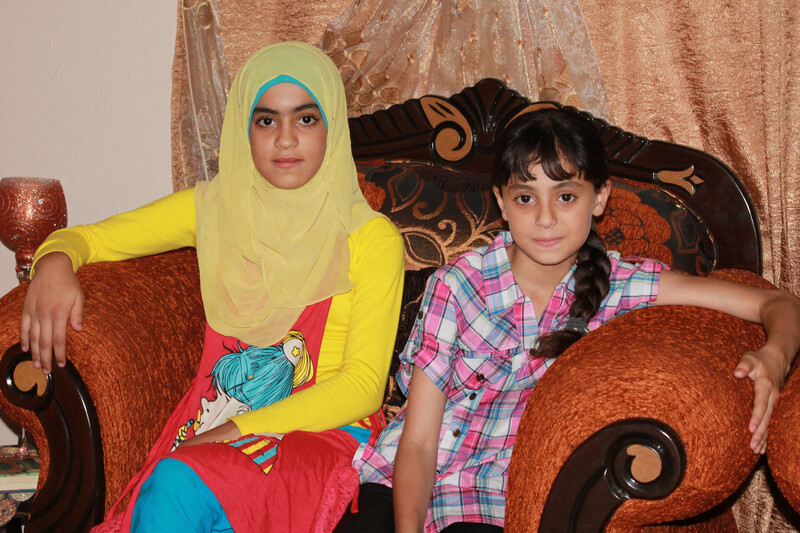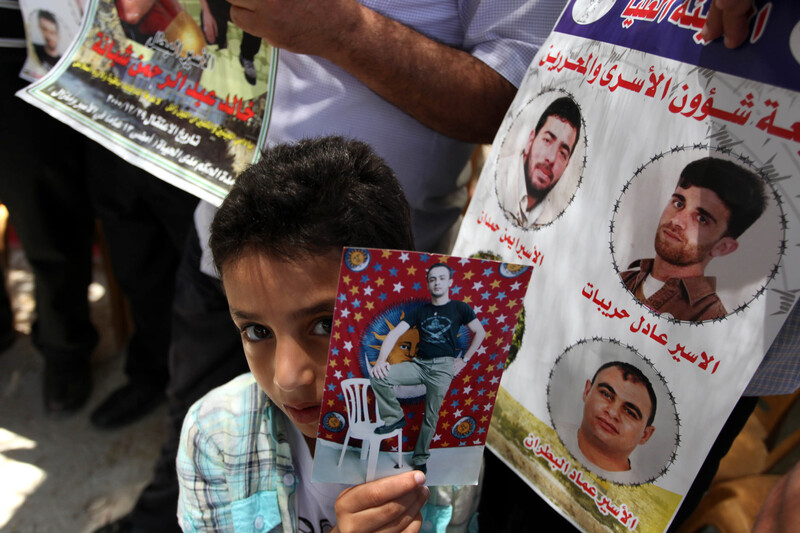The Electronic Intifada Beach refugee camp 10 July 2013

Manar and Ibtisam al-Nouri’s father has been in Israeli prison since the elder sister was one year old.
When Palestinian detainee Jamal al-Nouri was taken to an Israeli military court on 30 May, after suspending his hunger strike of 54 days, military prosecutors were ready to strike a deal.
“They offered to deport him to an Arab country of their choosing,” his wife Hala said Sunday, sitting in her father’s house in Gaza City’s Beach refugee camp.
“He accepted, and they promised him a final decision at the end of June,” she said. “Until now, they haven’t done anything else. They didn’t offer him any further details.”
“I don’t have any contact with him,” she added. “He’s isolated in Hadarim detention center.” During his hunger strike, jailers had isolated him in Beer Sheva prison.
Separations
Jamal is a refugee from Isdud (Ashdod), part of Israel since 1948, within eyesight of the Gaza coast near his father-in-law’s home. Before Israeli forces detained him on 1 July 2002, he lived with Hala in the central Gaza Strip’s Nuseirat refugee camp.
His capture separated Jamal not only from Hala, but also his daughters, Ibtisam and Manar. Manar, now twelve years old, was only one at the time. Eleven-year-old Ibtisam had not yet been born.
“He never saw Ibtisam, and hasn’t seen Manar since she was one,” Hala said of her husband. “He wants to see his daughters.”
Jamal launched his hunger strike on 3 March with two demands. He sought early release after serving two-thirds of his sentence, as Israel allows for its citizens and others tried in its civilian courts, but not Palestinians sentenced by its military.
In the short term, he wanted visits from his family.
“He demanded that his daughters be allowed to visit him,” Hala said. “They haven’t been able to see him since he was detained. They also didn’t allow me to visit him. For two years after he was captured, only his mother could go. I was finally allowed after two years. But I only saw him three times before prison visits were banned in 2007, and twice since they resumed last year.”
To end a mass hunger strike by Palestinian detainees in April and May 2012, Israel eased a ban it had imposed on family visits to detainees from the Gaza Strip in June 2007.
But it allowed only parents and spouses to travel to its prisons starting in July 2012, barring prisoners’ children.
It finally permitted visits by those younger than eight starting 6 May this year. But it continues to prohibit hundreds of older children, like Manar and Ibtisam, from seeing their fathers.
Growing hunger strikes

Relatives of Jordanian prisoners held by Israel protest in front of the Red Cross headquarters in the West Bank city of Ramallah, 18 June.
APA images“I’m very sad that I can’t communicate with our father,” Manar said. “I can only send letters and photos through the Red Cross.”
Jamal’s strike placed him among a growing number of hunger strikers held by Israel. Twenty-one Palestinian detainees are currently on strikes, according to a list provided Sunday by the Palestinian ministry of prisoners’ affairs in Gaza.
The longest-held administrative detainee, Ayman Issa Muhammad Hamdan, has gone without food since 28 April to demand his release. Israel renewed his detention order twice since invading his Bethlehem home and seizing him in the early morning of 21 August 2012. He was previously held for a total of 87 months, including two years of administrative detention (Ayman Issa Mohammed Hamdan, Addameer profile).
Administrative detention, a measure applied by the Israeli army, allows its military commanders to jail Palestinians for six-month terms that can be renewed indefinitely, without any charges.
Demands
Ongoing hunger strikes by Imad Batran, who began refusing food on 5 May, and Adel Hareebat and Ayman Tabeesh, both of whom started 23 May, have protested their own administrative detentions. Muhammad Tabeesh, sentenced by a military court to 18 months after two and a half months of administrative detention, has fasted since 12 June in solidarity with his brother Ayman.
Ghassan Aliyan, released on 18 December 2011 in the second phase of the prisoner exchange between Israel and Palestinian resistance groups, has been on hunger strike since 10 June. He is protesting recapture by Israeli forces, and the prospect that a military committee could order him to complete the remaining year of his original six-year sentence.
On 2 May, five Palestinians with Jordanian citizenship — Abdullah Barghouthi, Munir Maree, Alaa Hamad, Hamza Othman and Mohammad Rimawi — launched a group hunger strike.
They are demanding both visits from their families in Jordan and transfer to Jordanian prisons, as well as information on the whereabouts of disappeared Jordanians and the return to Jordan of deceased detainees’ bodies (“Highest number of individual hunger strikers since last year …,” Addameer, 18 June 2013).
Barghouthi, the longest-sentenced Jordanian citizen detained by Israel (67 life sentences), “announced that he won’t take glucose and will consume only water,” Atallah Abu Sebah, the prisoners’ minister, said in Gaza on Sunday. “By doing this he is using the historic Irish hunger striker’s model. He will eventually stop drinking water,” Abu Sebah explained.
Barghouti is a former commander of Hamas’ armed wing in the West Bank, and is accused of masterminding several bombings in Israel.
Others have been driven to strike by their residency status. “An increasing number of hunger strikes go back to the fact that some prisoners served their entire sentences and yet were not released due to not having a Palestinian ID,” said Islam Abdu, the ministry’s media unit manager. “For example, the prisoner Iyad Abu Khadeer served his full sentence of eight years but remained in prison. Now he is on hunger strike,” said Abdu.
Deportation
Like Jamal al-Nouri, Abu Khadeer lived in the Gaza Strip prior to his detention on 12 April 2005. A Palestinian with Jordanian citizenship, Abu Khadeer had moved to Rafah and married a resident in 1999. But because Israel had never listed him on the population registry it controls, it now seeks to deny him residency and deport him to Jordan.
Since former prisoner Khader Adnan began the current wave of individual hunger strikes, Israel has offered several detainees from the West Bank, like Hana al-Shalabi and Ayman Sharawna, forced relocation to the Gaza Strip in exchange for ends to their strikes.
Cases like Jamal al-Nouri’s and Iyad Abu Khadeer’s show this process moving further, trading detainees’ freedom for their deportations from Palestine altogether.
“We were happy with this decision” of Jamal’s to accept expulsion, Hala said. Asked about the deal’s implementation, she replied: “I stopped feeling anything. There is no hope with Zionists. They will shock you every time, as they have shocked me many times. I can’t bear another shock.”
“I want my father to know that I hope he we will be patient,” said eleven-year-old Ibtisam, who has never seen Jamal. “We love him very much, and hope to see him soon. Please be steadfast; we also are steadfast. We don’t forget you. You are always on our minds.”
Joe Catron is a US activist in Gaza, Palestine. He co-edited The Prisoners’ Diaries: Palestinian Voices from the Israeli Gulag, an anthology of accounts by detainees freed in the 2011 prisoner exchange, blogs at joecatron.wordpress.com and can be followed on Twitter: @jncatron.





